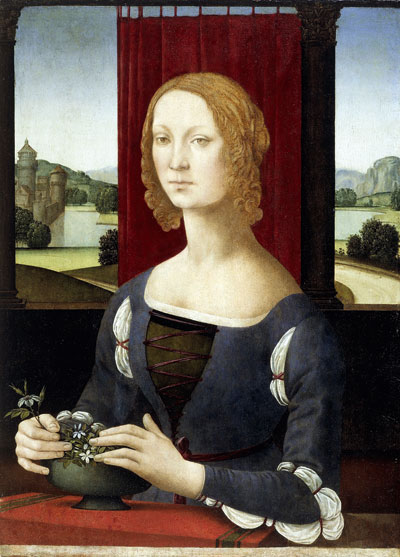In 1471 Galeazzo Maria Sforza, Duke of Milan, led a brash entourage of wine-swilling, jewel-bedecked courtiers into Florence. It was Lent. This was not the most auspicious way to begin a diplomatic mission to settle the dispute over Imola, the tiny Romagna fiefdom that Galeazzo had offered to sell to Lorenzo de’Medici. Even Lorenzo, epitome of the parvenu, was stunned by the fanfare. But for all the wrangling, within two years the territory would fall into Papal hands with the dowry of Caterina Sforza.
The Deadly Sisterhood is a wide-ranging historical narrative about the women and power struggles that dominated Italy in the late 15th and early 16th centuries. When Caterina celebrated her marriage with Girolamo Riario, nephew of Pope Sixtus IV, she was doing more than cementing relations between Rome and her native Milan. The union enabled the Pope to demand Imola as part of the dowry; but for this he required extra funds.
Leonie Frieda explores how Lorenzo’s refusal to foot the bill for the land he had failed to obtain for Florence led Sixtus to seek the financial backing of the Pazzi family. The latter would soon become notorious for butchering Lorenzo’s brother in the shadow of Santa Maria del Fiore. Girolamo would also lend a hand to that plot.
This triggered a complex chain of events which would eventually weaken many of the Italian states’ position in Europe, as the Holy Roman Empire extended its reach. And the fact that legitimacy was not essential to rule in Renaissance Italy did not make inter-familial relationships any less messy.
In his hunger for Imola and nearby Forlì, Cesare Borgia, son of Pope Alexander VI, subsequently captured Caterina Sforza and, by most accounts, raped her. Frieda’s suggestion that Caterina willingly embarked on a secret romance with the brute may lend too much weight to the sort of gossip that was spread about strong women at the time.
Caterina is also the subject of Elizabeth Lev’s Tigress of Forlì. Between Milan, where the illegitimate Caterina was born in 1463, and the Alps, over which Charles VIII of France dragged troops and syphilis onto Italian soil, one ill-judged move could spell speedy disaster, as Lev excels in conveying. Tigress of Forlì is a triumph.
The suggestion that Caterina is painted into Botticelli’s ‘Purification of the Leper’ helps to humanise this fascinating character, who can otherwise appear nothing less than a superwoman. More than once in her life she mounted her horse to protect her territory while heavily pregnant. She delivered a large brood, faced down male enemies mid-fray when her cowardly husband failed to, tended victims of plague which, again, Girolamo refused to do, and remained steadfast in her determination to protect Imola and Forlì. It is little wonder that she once declared: ‘If I were to write the story of my life, I would shock the world.’





Comments